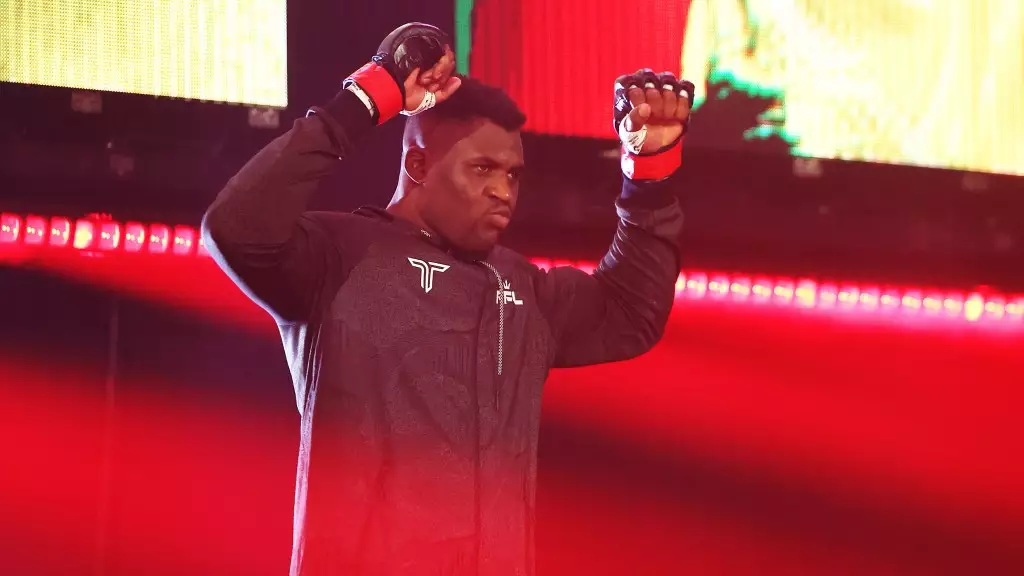The world of mixed martial arts (MMA) is rife with drama, rivalries, and the ever-complicated relationship between fighters and promoters. One of the most notable feuds currently occupying the spotlight is the ongoing saga between Francis Ngannou and UFC President Dana White. Their relationship has been characterized by complexities that extend far beyond typical promotional dynamics. Ngannou, who recently made headlines with a stunning performance in the PFL, is determined to retain a level of dignity in the face of White’s increasingly dismissive remarks. However, it’s essential to delve deeper into the motivations, perceptions, and implications of their ongoing conflict.
Francis Ngannou’s transition from the UFC to the Professional Fighters League (PFL) after a storied yet tumultuous tenure encapsulates the challenges faced by athletes striving for agency within the industry. Ngannou’s UFC career, marked by notable victories and a reign as the heavyweight champion, culminated in a departure sparked by contractual disagreements over his desire to pursue boxing. In stark contrast to what White posited, Ngannou saw the PFL as a feasible opportunity to broaden his horizons and maximize his earnings. This shift was not merely transactional; it represented Ngannou’s empowered quest for autonomy.
Ngannou’s rapid ascent in the PFL has drawn attention, particularly after his recent first-round TKO victory over Renan Ferreira. This win solidified his position as a formidable competitor in his new league and served as a poignant reminder of his capabilities. Yet, instead of congratulating Ngannou for his performance or even acknowledging the fight’s significance, White took to revisiting bygone grievances, framing Ngannou’s departure in a negative light while emphasizing his focus on financial gains.
In response to White’s critiques, Ngannou showcased his ability to navigate the turbulent waters of public opinion with commendable poise. His assertion that White’s constant negativity stems from an inability to accept loss is a particularly striking commentary on their dynamic. Ngannou expressed confusion over why White continues to harbor resentment and create a narrative that paints him as greedy or self-serving. The ex-champion emphasizes that, amidst adversity, he has successfully sought out and capitalized on opportunities that benefited him financially and professionally.
Ngannou’s insistence on conducting himself with integrity stands in stark contrast to White’s rhetoric. While some might argue that White’s comments are merely part of the promotional narrative, they often seem to transcend casual commentary, veering into an almost personal vendetta. Ngannou’s public assertion that White should make peace with their shared history underscores the broader implications of such relationships in professional sports. Maintaining cordial connections is vital for athletes determined to carve out futures filled with opportunities.
A significant aspect of Ngannou’s departure from the UFC lies in his desire to venture into boxing, a move that White’s promotion was unwilling to support. Ngannou has since entered lucrative boxing bouts with prominent figures like Tyson Fury and Anthony Joshua, generating significant income that many assume he could never have achieved within the constraints of his previous UFC contract. Consequently, Ngannou’s financial success post-UFC serves as a clear rebuttal to White’s assertions concerning his motives.
The contrast in their narratives highlights an intriguing trend within mixed martial arts: a growing recognition of fighter autonomy. As athletes increasingly seek opportunities beyond the bounds of traditional promotions, the landscape of MMA is evolving. Fighters like Ngannou are setting new precedents, underscoring a shift toward self-determination and financial independence that could reshape the sport’s dynamics.
The ongoing conflict between Francis Ngannou and Dana White extends beyond personal grievances; it symbolizes a broader evolution within the landscape of MMA. Ngannou’s journey, characterized by strategic decision-making and a pursuit of autonomy, reveals the increasing willingness of fighters to challenge established norms in search of better opportunities. Conversely, White’s unwillingness to let go of the past exemplifies the traditional promotional mentality resistant to change. As both figures navigate their respective paths, the repercussions of their rivalry will likely resonate within the industry for years to come, serving as a cautionary tale of pride, power, and the relentless pursuit of personal and financial freedom.

